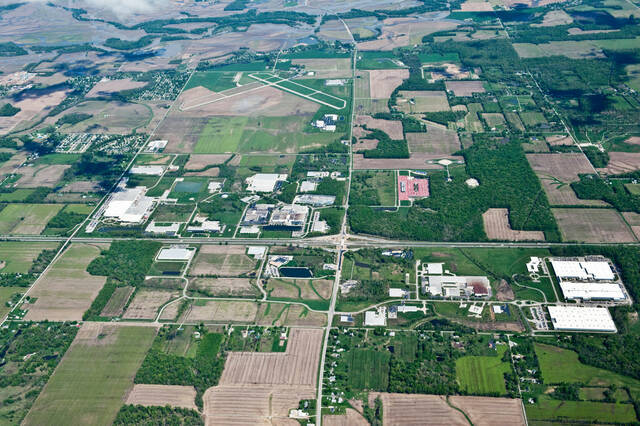Local officials are re-evaluating the projects they included in a proposal for Indiana’s multi-million dollar regional grant program after learning some of them may not be eligible for the funding.
In December, a region comprised of Bartholomew, Jackson and Jennings counties, along with the town of Edinburgh, was awarded a $30 million grant as part of a state initiative for economic development.
The grant program, called the Regional Economic Acceleration and Development Initiative, or READI, encouraged Indiana communities to partner together on proposals for future growth and improvement in their region, particularly talent attraction and retention.
Regional officials had hoped to use READI funds to help bankroll or support numerous projects in the greater Columbus area, including a research and development test track complex at the former Walesboro airport property, the NexusPark project at the site of the former FairOaks Mall in Columbus, expansion of the Seymour High Schools Owls Manufacturing Program and broadband access in rural Jennings County.
At the time, officials involved in the development of the regional grant proposal described the READI funding opportunity as “unprecedented” and a “game-changer” for the region, which initially sought $49.5 million in funding.
But the exact strings attached to the funding didn’t become fully known until the month after the local region was awarded the grant, when the U.S. Department of Treasury released its final rule, the Indianapolis Business Journal reported.
The grant program, approved the Legislature last spring, is funded by the American Rescue Plan Act, or ARPA, which focuses on pandemic-related recovery, not general economic development.
“There have been some concerns expressed locally and by other regions around the state that the funds that the state of Indiana wanted to use for READI were federal funds and would require us to follow some federal guidelines,” said Columbus Mayor Jim Lienhoop, who sits on a regional steering committee that is weighing how to prioritize the grant funding. “The state initially had told us not to worry about that. They didn’t think that would be the case. And well, guess what, it is the case. So some of the projects that we had initially submitted are likely not going to qualify.”
Currently, members of the steering committee are “spending just a lot of time to learn, ‘Well, what are those rules exactly, and how might our projects fit?’” said Jason Hester, president of the Greater Columbus (Indiana) Economic Development Corp., who also sits on a committee.
Hester said the committee was already anticipating making cuts to the regional proposal because they had received 60% of the money they had requested.
Ineligible project
So far, at least one proposed project in the Columbus area — a mobility test track park and proving ground for autonomous vehicles in Walesboro — believed to be ineligible for READI funds, Hester said.
In their grant proposal, regional officials had asked for $6.9 million in READI funds to help construct the first phase of 700-acre mobility test complex and proving ground at the former Walesboro airport for autonomous, electric and alternative fuel vehicles, which are seen as key drivers of the future viability of some of the area’s largest employers, including Cummins Inc. and Faurecia Clean Mobility.
The overall project was expected to include, among other things, a new replacement track for Cummins, enhanced privacy for Faurecia, an autonomous vehicle pad and a new facility for LHP Engineering Services.
The project has been envisioned and considered by Columbus officials for several years. Cummins and Faurecia are currently using the former Walesboro runways as a test track.
“We just don’t, at this time, see how … that project would qualify for the ARPA funds,” Hester said. “So that’s one project that, at this point, we’re putting on the backburner for READI funds.
“That’s just a project that we don’t see being able to move forward without READI funds,” Hester added. “…That really was what was going to kickstart this project.”
Additionally, plans to use the READI grant to help fund an apartment complex and urban grocer on Second Street next to the Bartholomew County Jail likely won’t pan out due to timing, Lienhoop said. The development is expected to include, among other things, 200 market-rate apartments, 12,000- to 15,000-square-feet of grocer space and 400 parking spaces.
“We had hoped to tap some READI funds to basically stretch the city’s dollars, put some READI funds into that project, and then that would free up the city’s dollars for other activities,” Hester said.
Lienhoop said he doesn’t anticipate any problems funding the project.
“I’m not concerned,” Lienhoop said. “I think we’ll be able to find the money we need somewhere else.”
Other projects
Besides the downtown apartment complex and urban grocer project, city officials were also keen on using READI funds to bankroll a portion of the total cost of other projects in Columbus that had been in the works for some time, including the Riverfront Project, a downtown hotel and conference center and NexusPark, a project that seeks to transform the former FairOaks Mall into a health, wellness and recreation center.
The talent region stated in its READI grant proposal that the funds NexusPark would “support the currently unfunded exterior campus and connector facilities, including community park spaces, People Trails and access to a public transportation hub.”
The proposal also stated that, “with READI support, construction on the (Riverfront) project can start in 2022.” The project seeks to redevelop the riverfront between the Second and Third Street bridges downtown, including overlooks into East Fork White River, the removal of the low-head dam, connections to the People Trail system and an in-water recreation area.
The READI grant funds were also being proposed to fund an estimated 400-space parking lot to support a downtown hotel and conference center, as well as events in downtown Columbus, the proposal states.
In some cases, the wording of the proposed projects may only need to be tweaked to meet eligibility requirements, said Eric Frey, executive director of the Southern Indiana Housing and Community Development Corp., which is the lead applicant on the region’s READI proposal, who also is on the regional steering committee.
Frey said the talent region is working with the Indiana Economic Development Corp. and Ernst &Young Global Ltd. to ensure the region is in compliance with the funding requirements. Lienhoop said he anticipates have a good handle on what projects will be prioritized by June.
“We’re kind of working through with them, just getting the right wording and semantics and structure to the projects so that we can move them forward,” Frey said. “…So far, we’ve been able to move forward in our discussions with them quite well.”
Initially, regional officials had sought a combined $13 million in READI funds for the four city projects, including $6 million to support NexusPark, $3 million each for the downtown hotel and conference center and the downtown housing and urban grocer, as well as $1 million for the Riverfront Project, the proposal states.
However, those amounts may change as the committee makes adjustments.
Lienhoop said he is still under the impression that NexusPark, the Riverfront project and the downtown hotel and conference center likely will qualify for READI funding.
“We’ve had several conversations with our contacts at IEDC, and they’ve encouraged us to continue to pursue those projects, or at least pursue READI funding for those projects,” Lienhoop said. “And so we will do that. We’re in the process right now of submitting some paperwork for NexusPark, because that’s our next most shovel-ready project.”
“They’ve continued to be encouraging, so we’re going to take them at their word,” Lienhoop added.
Next steps
Currently, the Indiana Economic Development Corp. is working with regions to navigate the federal rules and determine which projects are eligible for READI money, according to the Indianapolis Business Journal.
Proposals were selected based on their economic development potential, their focus on Indiana’s rural communities, the degree of regional collaboration, and their alignment with the state’s economic development priorities.
Evaluation guidelines given to the regions to help them draft proposals did not mention that projects would have to comply with ARPA rules. Regions were told limitations might be added later, but they were told to not let that limit their plans, Mark Wasky, IEDC’s senior vice president of community affairs, told the IBJ.
“We didn’t want to, I guess, hit the reset button on what the intention of the program was,” Wasky said. “We encouraged regions to continue down the path that was originally set, and that we would work on figuring out the details.”
He also noted that most regions did not receive their full funding requests to begin with, so they were always aware that each project might not get every dollar requested.
“We were going for just under $50 million,” Hester said. “We were awarded $30 million, so automatically, that’s 40% less funds. …We were already going to have to make some cuts.”
“We’ll also get some great projects done — $30 million is still $30 million more than what we had,” Hester added.
But for now, regional officials say they are working to figure out what will qualify for the grants and how to prioritize the eligible projects.
“I think everybody was excited about what opportunities they had,” Frey said. “Then, as everybody moved forward, whether it’s here in the county or whatever, they started finding out a little more about what they can and can’t do and limitations or requirements. I think everybody was getting ready to just rush and run and then kind of had to take a step back.”
“I think everybody is working to make sure that what the communities need and want to do, that they help try to achieve that goal as best they can,” Frey added. “At this point in time, that’s all we can ask.”





